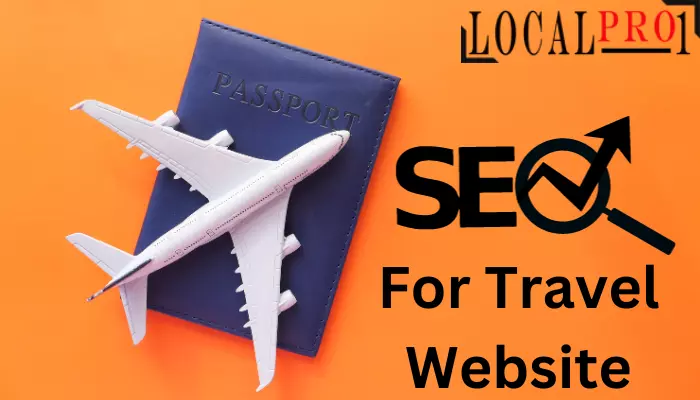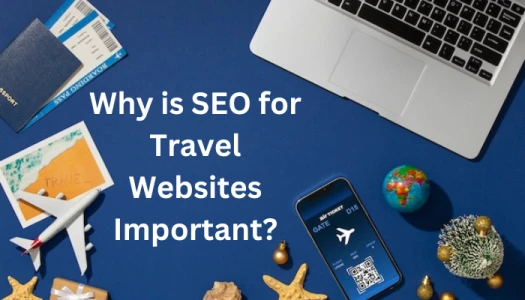Local SEO Services Near Me | Local Pro1 Welcome to...
Unlocking Success: Local Pro1’s Ultimate Guide to SEO for Travel Websites
Unlocking Success: Local Pro1's Ultimate Guide to SEO for Travel Websites
A website’s ability to get seen in search engine results is often critical to its success in the always-changing digital market. For travel websites, where competition is fierce and diverse, mastering Search Engine Optimization (SEO) is crucial.The term SEO pertains to the methods and strategies used strategically to improve a website’s exposure on search engines such as Google, Bing, and Yahoo.In the realm of travel, SEO plays a pivotal role in shaping online presence and attracting potential travelers. Local Pro1 provides the best service of SEO for Travel Websites.

Definition of SEO for Travel Websites
Travel websites can benefit from SEO by using a diverse strategy to optimizing several areas in order to raise their search engine results. Both on-page and off-page optimization techniques are included in this. Making content, meta tags, and HTML elements more search engine friendly is known as on-page SEO. It also involves refining the overall structure of the website, optimizing pictures, and speeding up page loads. On the other hand, off-page optimization concentrates on outside elements like online reputation management, social media signals, and backlinks.
Importance of SEO in the Travel Industry:
Increased Visibility and Traffic: In a vast and competitive online space, appearing on the first page of search results is paramount. Travelers typically rely on search engines to discover destinations, accommodations, and activities. Effective SEO enhances a travel website’s visibility, driving organic traffic and increasing the likelihood of attracting potential customers.
Credibility and Trust: High search engine rankings often equate to credibility in users’ eyes. Travelers are more likely to trust websites that appear at the top of search results. By implementing sound SEO services, travel websites can establish themselves as authoritative sources, fostering trust among their target audience.
Cost-Effectiveness: Compared to paid advertising, SEO offers a cost-effective means of driving traffic. While paid strategies can be effective, maintaining a strong organic presence through SEO can result in sustained visibility over time without incurring ongoing advertising costs.
User Experience Improvement: SEO is not solely about pleasing search engines; it also involves enhancing the user experience. Travel websites that prioritize SEO often create content that is informative, relevant, and easy to navigate. This, in turn, contributes to a positive user experience, increasing the likelihood of user engagement and conversion.
What is SEO for Travel Website?
Overview of SEO Concepts:
Search Engine Optimization (SEO) is the practice of optimizing a website to improve its visibility and ranking on search engine results pages (SERPs). The primary goal is to attract organic (non-paid) traffic to the website by making it more accessible and appealing to search engines.
Key SEO concepts include:
Keywords: Identifying and incorporating relevant keywords into website content to match user search queries.
On-Page Optimization: Optimizing individual web pages for search engines, including the use of meta tags, header tags, and strategic keyword placement.
Off-Page Optimization: Building external signals such as backlinks from reputable websites to establish credibility and authority.
User Experience (UX): Ensuring a positive and seamless experience for website visitors, including fast loading times, mobile responsiveness, and high-quality content.
Local SEO: Optimizing for local searches to target audiences in specific geographical areas.
Specifics of SEO for the Travel Industry:
Importance of Local SEO: Travel businesses rely heavily on local clientele and tourists. Optimizing for local searches is crucial for attracting nearby customers. Utilize Google My Business (GMB) to provide accurate business information, such as location, hours, and reviews.
Unique Challenges in Travel SEO:
Intense Competition: The travel industry is highly competitive, making it challenging to rank high for generic keywords.
Seasonal Trends: Travel demand can vary based on seasons, holidays, and events, requiring flexible and dynamic SEO strategies.
Role of Keywords in Travel SEO:
Long-Tail Keywords: Targeting specific, longer phrases related to travel destinations, activities, or services can help capture more qualified traffic.
Trend Analysis: Stay updated on travel trends and incorporate trending keywords to align with current interests and preferences.
Geo-Targeted Keywords: Including location-specific keywords helps attract users looking for travel options in a particular region.
How Should You Implement SEO for Travel website?

Keyword Research and Selection:
Identifying Relevant Travel Keywords: Research and identify primary travel-related keywords, such as destination names, travel activities, and services. Use tools like Google Keyword Planner, SEMrush, or Ahrefs to find high-search-volume keywords related to your travel niche.
Long-tail Keywords for Niche Markets: Target long-tail keywords that reflect specific aspects of travel, catering to niche markets. Consider user intent and create content around specific queries (e.g., “best family-friendly resorts in Bali”).
On-Page SEO Optimization:
Title Tags and Meta Descriptions: Craft compelling and keyword-rich title tags that accurately represent the content. Write engaging meta descriptions to encourage clicks and provide a concise summary of the page.
URL Structure for Travel Websites: Keep URLs concise, and relevant, and include target keywords. Use hyphens to separate words, making URLs easily readable (e.g., /best-hotels-in-paris).
Image Optimization: Optimize images for faster loading times, ensuring a positive user experience. Use descriptive file names and alt text to help search engines understand the content of the images.
Off-Page SEO Strategies:
Link Building for Travel Websites: Build high-quality backlinks from authoritative travel websites, blogs, and directories. Guest posting, influencer collaborations, and partnerships can help acquire valuable links.
Social Media Engagement: Share engaging travel content on social media platforms to increase brand visibility. Encourage user-generated content by running contests or using branded hashtags.
Online Reviews and Reputation Management: Actively seek and manage online reviews on platforms like TripAdvisor, Google My Business, and Yelp. Respond to both positive and negative reviews professionally, addressing concerns and showcasing your commitment to customer satisfaction.
Additional Tips:
Mobile Optimization: Ensure your website is mobile-friendly, as many travelers use mobile devices to plan and book trips.
Local SEO: Optimize for local search by claiming and updating your Google My Business listing with accurate business information.
Content Quality: Create high-quality, informative, and engaging content that adds value to the user experience.
Page Speed: Optimize page loading times to improve user satisfaction and SEO rankings.
What About Travel Content Marketing?
Importance of Quality Content in Travel SEO:
Relevance: Quality content writing ensures that your website is relevant to search queries, improving its search engine ranking.
Authority: Well-researched and informative content establishes your website as an authoritative source in the travel niche.
User Experience: Engaging content enhances the user experience, reducing bounce rates and encouraging longer visits.
Creating Engaging and Informative Travel Content:
Blog Posts and Articles: Craft compelling narratives and share personal experiences to connect with readers. Include practical information, travel tips, and insights about destinations. Optimize blog posts with relevant keywords for SEO benefits.
Visual Content (Images and Videos): High-quality images and videos capture attention and provide a visual preview of destinations. Incorporate multimedia elements to showcase the unique aspects of travel experiences. Optimize image alt text and video descriptions for SEO.
User-Generated Content: Encourage travelers to share their experiences through reviews, testimonials, and social media. Utilize user-generated content to build trust and authenticity. Showcase user-generated content on your website and social platforms.
Incorporating SEO into Content Marketing:
Keyword Integration: Conduct keyword research to identify relevant and high-traffic keywords. Naturally integrate keywords into your content, including titles, headings, and body text. Use long-tail keywords to capture specific travel-related queries.
Content Structure for SEO: Organize content with clear headings and subheadings for easy readability. Could you use meta titles and descriptions that entice users and include important keywords? Implement internal linking to connect related content and improve SEO .
Why is SEO for Travel Websites Important?

Enhancing Online Visibility: SEO helps travel websites appear higher in search engine results, increasing the likelihood that potential travelers will find and visit the site.
Driving Targeted Traffic: By optimizing for relevant keywords and phrases, SEO ensures that the website attracts users specifically interested in travel-related information or services, leading to higher-quality traffic.
Improving User Experience: SEO involves optimizing website structure, content, and design, contributing to a better overall user experience. This can include faster loading times, mobile responsiveness, and user-friendly navigation—all of which are essential for retaining visitors.
Boosting Conversion Rates: An optimized travel website not only attracts visitors but also encourages them to take desired actions, such as booking a trip or subscribing to newsletters. SEO contributes to creating compelling content, clear calls-to-action, and a seamless user journey, all of which can boost conversion rates.
Staying Competitive in the Travel Industry: The travel industry is highly competitive, with numerous websites vying for the attention of potential travelers. A strong SEO strategy allows a travel website to stand out, compete effectively, and maintain a prominent online presence.
Conclusion
Optimizing your travel website for search engines is a mission critical endeavor in the digital age. The strategies discussed, ranging from meticulous keyword research to on-page optimization and fostering a robust backlink profile, collectively contribute to elevating your website’s visibility and ranking on search engine results. Feel free to contact us for any type of query service.
FAQs
What Is Seo, And Why Is It Important For A Travel Website?
SEO stands for Search Engine Optimization, a set of techniques to improve a website’s visibility on search engines. For travel websites, SEO is crucial to increase organic traffic, attract potential customers, and enhance online presence.
How Can I Optimize My Travel Website For Search Engines?
Optimize your website by using relevant keywords, creating high-quality content, improving site speed, utilizing meta tags, and building high-quality backlinks. Implementing a mobile-friendly design is also essential for SEO.
What Role Do Keywords Play In Seo For Travel Websites?
Keywords are critical in SEO for travel websites as they help search engines understand the content of your pages. Choose relevant and industry-specific keywords related to travel destinations, services, and customer queries to improve your site’s ranking.
How Can I Create Compelling Content For My Travel Website?
Develop content that is informative, engaging, and relevant to your audience. Include destination guides, travel tips, unique experiences, and user-generated content. Regularly update your blog with fresh and valuable information to keep visitors coming back.
Is Local Seo Important For Travel Websites?
Yes, local SEO is crucial for travel websites, especially for businesses that cater to specific locations. Optimize your Google My Business profile, use location-based keywords, and encourage customer reviews to enhance your visibility in local search results.
Our Services
Our Latest Posts
PPC White Label Services by Local Pro1 | Expert Solutions
PPC White Label Services by Local Pro1 | Expert Solutions...



